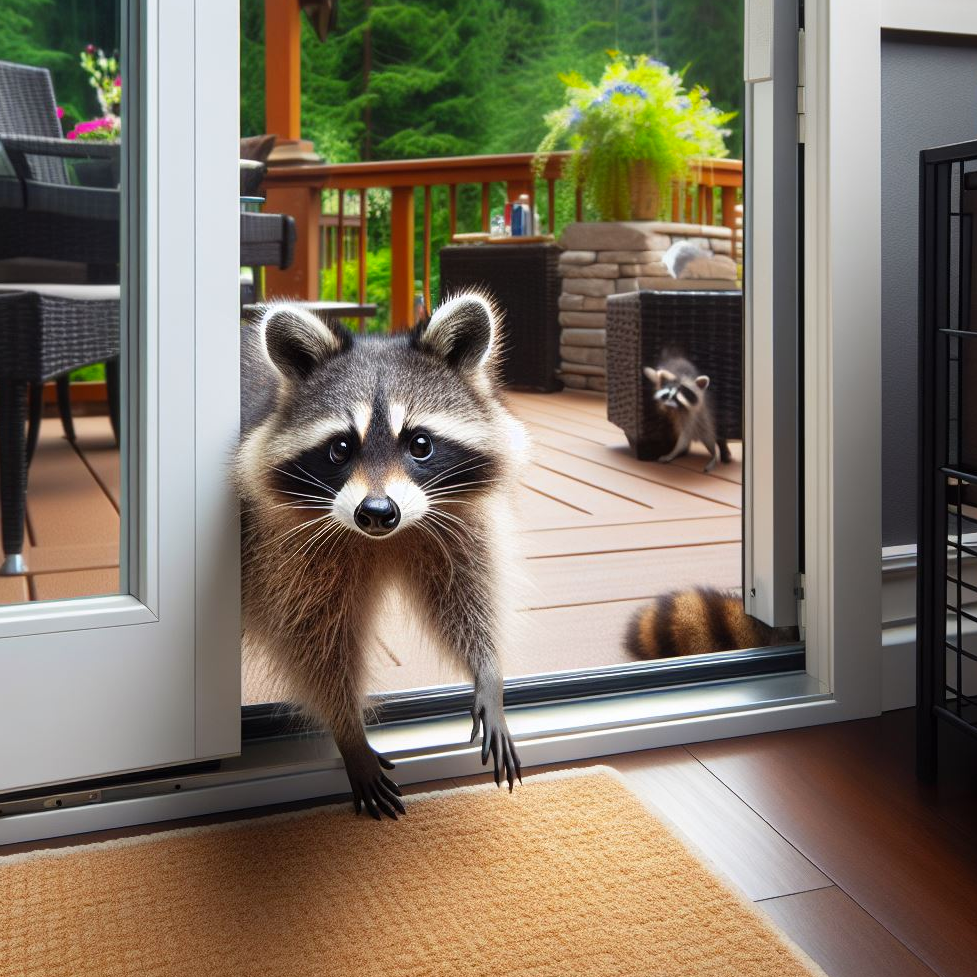Raccoons are incredibly intelligent and resourceful animals that have adapted well to living alongside humans. Their nimble paws and sharp claws enable them to manipulate all kinds of objects, including doors and locks. If a raccoon is determined enough, it can potentially figure out how to open doors and enter homes in search of food.
So can raccoons actually open doors? The short answer is yes. Raccoons are very capable of opening unlocked doors, sliding doors, pet doors, and some types of latches. With their dexterous front paws, they can lift handles, turn knobs, and undo basic locks. And if sufficiently motivated by hunger or curiosity, raccoons have even been known to break into homes through locked doors and windows.
While the prospect of a raccoon breaking into your home may be alarming, there are preventative measures you can take to raccoon-proof your house. With some simple precautions like locking doors and windows, installing secure locks, and using deterrents, you can outsmart these clever bandits. This article covers everything you need to know about raccoons and doors, including what kinds they can open, how to keep them out, and what to do if one makes its way inside.
Raccoons Have the Physical Tools to Open Doors
Raccoons have several physical attributes that enable them to grasp handles and manipulate locking mechanisms:
- Dexterous front paws – A raccoon’s front paws resemble hands, with five toes that allow them to grasp and clutch objects. They have a high degree of manual dexterity in their forelimbs.
- Sharp claws – Raccoons have non-retractable claws that provide traction for climbing and tearing things apart. The claws also give them a firm grip on door handles.
- Strong teeth – If locks or latches prove too tricky, some raccoons may chew or bite through door frames and tear at weather stripping to gain entry. Their teeth give them another tool for breaking and entering.
- Excellent problem-solving skills – In addition to physical features, raccoons are incredibly intelligent and curious. They can learn through trial-and-error and remember solutions to complex puzzles, like unlatching gates and opening locked pet doors.

Simple Latches and Handles Are No Match for Raccoons
Raccoons can easily open doors that are unlocked or have simple latching mechanisms:
- Unlocked knob doors – An unlocked doorknob requires no force to open. Raccoons simply have to twist the handle downwards with their nimble paws to pull the door open. Make sure all entry doors are locked, even when home.
- Lever-style handles – Lever handles require less dexterity than knobs, allowing raccoons to easily push lever handles down with their paws or body weight, letting themselves inside.
- Slide latch doors – Any horizontal sliding latch, like those on screen doors or chain-link gates pose no major challenge. Raccoons are strong enough to slide these open.
- Pet doors – The flap doors found on many pet doors don’t provide a seal tight enough to keep out a determined raccoon. Make sure pet doors are securely locked at night.
So simple latches, sliders, and flaps can be easily overcome by an adult raccoon seeking entry. Have any of these vulnerability points around your home? Take measures to reinforce them.
Some Raccoons Can Open Complex Locks Too
If a basic latch or handle doesn’t suffice, some urban raccoons have learned how to open more complex home locking systems:
- Child safety locks – Special locks intended to prevent children from accessing dangerous areas won’t necessarily guard against intelligent raccoons. They can manipulate childproof latches over time.
- Deadbolts – Even deadbolts aren’t guaranteed protection. In rare cases, very motivated raccoons have been known to unlock deadbolts on front doors, or find ways to reach through mail slots to undo them.
- Doorknobs with key locks – As unbelievable as it may sound, there are credible reports of raccoons unlocking doors with actual keys! In Toronto, one mischievous raccoon learned how to pick up keys with his paws and unlock apartment doors from the outside. The aptly-named “Keys” raccoon terrorized one neighborhood for weeks by breaking into homes at night to feast on leftover food.
So while complex locks will deter most raccoons, homeowners shouldn’t assume they are impervious to those that are clever, lucky, or desperate enough. Upgrade home security measures if any doors show signs of tampering by wildlife intruders. Reinforce trouble spots with kick plates, automatic garage door locks, and steel or mesh screen doors.

Vulnerable Entry Points Raccoons Can Exploit
In addition to doors, raccoons are adept at infiltrating homes through other weak spots in order to reach tasty treats on the other side:
Pet Doors
Pet doors designed for cats and small dogs have flexible flaps that don’t keep out small wildlife. Some models have a slide lock, which helps, but raccoons are strong enough to force the flap open or tear holes through the plastic or vinyl. Make sure pet doors are tightly sealed at night.
Open Windows
On upper floors, raccoons are excellent climbers and can scale downspouts or climb exterior walls with textured sidings to reach open windows. Always close windows before heading to bed or leaving the house.
Chimneys
Raccoons can scramble right down chimneys with their textured walls. Install chimney caps and cover your flue when not in use. Stainless steel is too slick for them to get traction.
Roof Vents
Roof and attic vents make another prime target, especially if trees overhang the roof. Ensure vents have covers and screens that are firmly attached.
Garage Doors
Raccoons can slip under loose-fitting garage doors or through tears in weather stripping. Keep garage doors tightly sealed with automatic locking mechanisms, especially if pet food is stored inside.
Dryer Vents
Like any dark cavity, raccoons can tear open dryer vent covers on exterior walls and crawl right through the ducting into basements or laundry rooms. Ensure dryer ducts have no holes and vent flaps swing freely.
So in addition to doors, identify and reinforce any weak points in your home’s exterior that could grant access to uninvited raccoons prowling around at night. Deter all points of entry with improved lighting and loud noises to discourage their curiosity.
Effective Ways to Raccoon-Proof Doors
Fortifying home entryways is the best defense against late-night raccoon break-ins. Follow these tips to outsmart their clever paws:
Install Deadbolts on All Doors
Deadbolts can thwart even dexterous raccoons, so long as the lock cylinder is pick-proof and there is minimal space between door and frame. Ensure deadbolts have at least a one-inch throw length.
Reinforce Pet Doors
Lock pet doors every night and consider installing steel flap models instead of plastic. Better yet, just don’t have a pet door at all.
Use Childproof Locks
For handles already equipped with key locks, adding simple child latches higher up can help block raccoons. Just beware that very determined ones may eventually defeat them.
Install Kick Plates
Metal or high-strength polycarbonate kick plates along the base of doors prevent raccoons from chewing through weather stripping or gnawing around the locks.
Use a Steel Security Door
A heavy-duty steel mesh security door creates a second barrier, even if your main door’s locks fail. They come with their own deadbolts too.
Block Access to 2nd Story Windows
Trim back trees and vegetation touching the house exterior. Smooth surfaces like PVC or metal leave no purchase for sharp claws.
Remember, an ounce of prevention is worth a pound of cure when it comes to excluding destructive raccoons! Invest in robust home security measures now instead of paying for damage control down the road.
Still need help making your home raccoon-resistant? Contact wildlife removal experts for site evaluations and custom solutions.
What To Do If a Raccoon Gets Inside Your House
In spite of your best efforts, a clever raccoon may occasionally find its way into your living space. If this happens, here is a game plan to escort “Rocky” raccoon from the premises without harm:
Remain Calm and Act Quickly
Try not to startle the intruding raccoon. Shut all interior doors to isolate it in one room while planning safe removal. The longer it stays inside, the more nervous (and destructive) it may become.
DO NOT Attempt Capture Alone
It might be tempting to take matters into your own (ungloved) hands, but never try capturing a cornered raccoon without professional help. Frightened raccoons will bite in self defense, which could expose you to rabies or nasty infections. Call pros instead.
Contact Wildlife Control Services
Look up 24-hour wildlife removal experts operating in your area. Emergency raccoon extraction typically costs $125-$300. Ensure companies humanely remove and relocate animals per laws.
Seal Up the Entry Point
While waiting for raccoon eviction services to arrive, temporarily pack the suspected entryway with towels to deter it from escaping deeper into your home. Once the expert extracts the raccoon, properly seal the problem doorway for good.
Disinfect all Surfaces
Raccoons can spread diseases and parasites through feces and saliva. Thoroughly clean any items or surfaces the raccoon touched using disinfectants or bleach solutions.
Unwanted raccoon break-ins can be distressing, but resist the urge to take reckless actions in the heat of the moment. Work quickly but safely with trained wildlife management pros to remove the trespasser humanely while protecting your family’s health. Reinforce your home’s boundaries so no other late night critters come wandering in!
In Conclusion
Raccoons may look cute, but they can cause real damage when they encroach on human living spaces in search of free meals. Homeowners must remain vigilant in keeping wild opportunists out of houses and away from families and pets.
While no home security system is completely impenetrable to a highly adaptable creature like the raccoon, taking proper precautions can thwart break-ins from all but the craftiest individuals. Maintain robust perimeter defenses, eliminate vulnerability points, deter external activity zones, and call in pros when all else fails. With some added awareness and proactive reinforcements, we can coexist peacefully with our ring-tailed, bandit-masked, neighbors.
Now that you know raccoons have the smarts and physical dexterity to breach doors, windows, and other home access points, are you prepared to outsmart them? Take preventative action before you have an uninvited guest ransacking your pantry or taking up residence in the attic. And reach out to wildlife pros when confrontations arise so animal invaders can be safely removed and relocated without harm. Stay one step ahead of brilliant raccoons by fortifying your home’s boundaries today!
Interesting Facts About Raccoons
So in addition to raiding trash and occasionally sneaking into homes, raccoons exhibit all kinds of fascinating abilities and behaviors worth knowing:
- Raccoons are incredibly dexterous, able to open latches, doorknobs, jars, and zippers with their nimble five-fingered paws.
- They can remember solutions to tasks for at least 3 years and pass learned behaviors from generation to generation.
- Raccoons see in color and have excellent night vision to scope out food sources after dark.
- They can rotate their hind feet to climb down from trees head-first, which is unique among mammals.
- Urban raccoons are noticeably fatter and healthier than their rural counterparts, thanks to readily available food waste.
- Mother raccoons are devoted parents during their kits’ first year, patiently teaching them survival skills.
- Captive raccoons can be friendly pets but require lots of space and enrichment. They’re still wild opportunists at heart!
Raccoons get a bad rap as nuisance animals, but they’re just trying to survive with adaptable intelligence in a human-dominated world. As suburban development expands, raccoon conflict will only increase. So coexist peacefully through better trash containment, securing entry points, removing food attractants, and deterring problem individuals humanely. With a little more awareness and tolerance, we can learn to live alongside these remarkably resourceful neighbors.
Just don’t leave any doors unlocked around them!
Hey there, fellow nature enthusiasts! I’m Mark Gray, the passionate owner of OutdoorAnimals.com, a hub dedicated to uncovering the incredible world of outdoor animals. Whether you’re a hiker, a four-wheeler, or just someone who revels in the beauty of the great outdoors, you’re in the right place. I seek to understand all varieties of animals, from the great elk to the simple mouse, my goal is to write and share this knowledge with the public.

